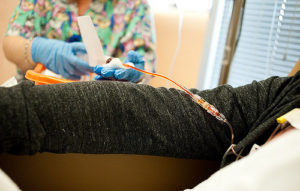Among all the diseases that affect humans, cancer is, without a doubt, one of the most feared. And for good reason, as it is a disease that can cause significant suffering, has complicated treatment options, and is extremely dangerous. There are so many different types of cancer that it is very difficult to know exactly how each one may arise and how it might affect us. That’s why today we are going to talk about pancreatic cancer—its symptoms, causes, and treatment options. This is one of the most common ways the disease can manifest, and for that reason, it’s important to understand it as thoroughly as possible.
What is Pancreatic Cancer?
Pancreatic cancer, or cancer of the pancreas, is a disease characterized by the development of malignant tumors in certain cells of the pancreas. It is a dangerous disease, as it takes a long time to present symptoms and, often, by the time it is discovered, the malignant cells may have already spread to other organs, greatly complicating treatment and posing a significant risk to the patient’s life. As with any other type of cancer, this is a disease that causes tremendous concern and is extremely dangerous. For this reason, the main recommendation is to keep all exams up to date, especially for those who are part of risk groups—a topic we will discuss later on.
What Causes Pancreatic Cancer?
Often, it is not possible to identify the exact cause of the disease, although several factors increase the likelihood of its appearance. These factors include:
- Smoking (the main factor);
- Acute pancreatitis;
- Type 2 diabetes;
- Alcoholism;
- Gallbladder removal;
- Exposure to chemical products
Symptoms of Pancreatic Cancer
One of the main problems with pancreatic cancer is that it is a disease that takes a long time to show any sign of its presence, as we’ve mentioned before. This delay can be extremely harmful because the earlier cancer is treated, the better the chances of a cure. Still, when symptoms do appear, they are usually:
- Severe pain in the abdominal area;
- Unexplained weight loss;
- Fatigue;
- Loss of appetite;
- Dark urine;
- Yellowing of the eyes;
- Nausea
The main issue with these symptoms is that many of them can also indicate that the malignant cells have already spread to other organs, which is a sign of an advanced stage of the disease.
Treatment for Pancreatic Cancer
There are several treatment options available to fight pancreatic cancer. We will briefly discuss each one and how they help in the fight against the disease.
- Chemotherapy – Medicines are used to kill the cancer cells that are multiplying. At the same time, other medications are given to alleviate some treatment side effects, such as severe nausea and hair loss.
- Radiotherapy – This is a procedure that uses X-rays to kill cancer cells. Its side effects tend to be milder, but the treatment itself may also be weaker than chemotherapy.
- Surgery – In many cases, surgery is required to remove the cancerous cells. This surgery is quite complex and may involve removal of parts of the pancreas or even other organs such as the large intestine and the stomach.
Usually, all three types of treatment are used to combat the disease, especially chemotherapy and surgery. Only a doctor can determine the level of success of the treatment and the likelihood of the disease not returning, as it varies greatly from case to case. 
Prevention of Pancreatic Cancer
It is true that sometimes, for genetic reasons, cancer can appear without warning. However, it’s important to know that these cases are much rarer and that the ways to prevent pancreatic cancer are truly important. Avoiding excessive smoking and drinking is the best way to reduce your chances of developing pancreatic cancer. For people who already have a disease in the region, it is recommended to undergo regular check-ups to make sure everything is fine and, if there are any signs of the disease, to catch it early.
Risk Groups
There are some risk groups who need to be more cautious about pancreatic cancer. They are:
- Obese people;
- Smokers;
- People who drink a lot of alcohol;
- Those with a family history of the disease or pancreatic diseases;
- Exposure to chemicals such as pesticides;
- People over 45 years old.
- People with diabetes
The number of cases of the disease is very similar between men and women, so gender is not a risk factor for this disease.
Life After Treatment
The battle against cancer is exhausting, both physically and emotionally, and returning to normal life after this fight is not an easy task. Realizing that you are a survivor will bring many questions and possibly a change in how you view life. All of this is very normal, and most people in this situation go through similar things. It is advisable to see a psychologist to help you deal with all these issues in a healthy way and learn to live happily and healthily in this new phase of life. It is always important to stay informed about all types of diseases, especially if you are part of a risk group. It is true that some types of cancer appear suddenly and take you by surprise, but that is precisely why it is so important to know their main symptoms, causes, and treatments. If nowadays pancreatic cancer is still a disease that causes a lot of concern, it used to be even more worrying when medicine and science were not as advanced as they are today. Do not neglect prevention or keeping yourself informed about anything that can affect your health. This is, in fact, a smart way to stay healthy. See also: Ascites: What It Is, Causes, Symptoms, and Treatments Photo: Stephen Dickter











